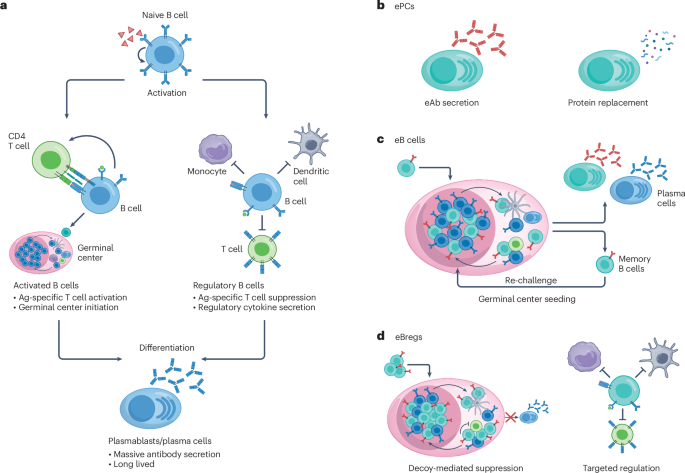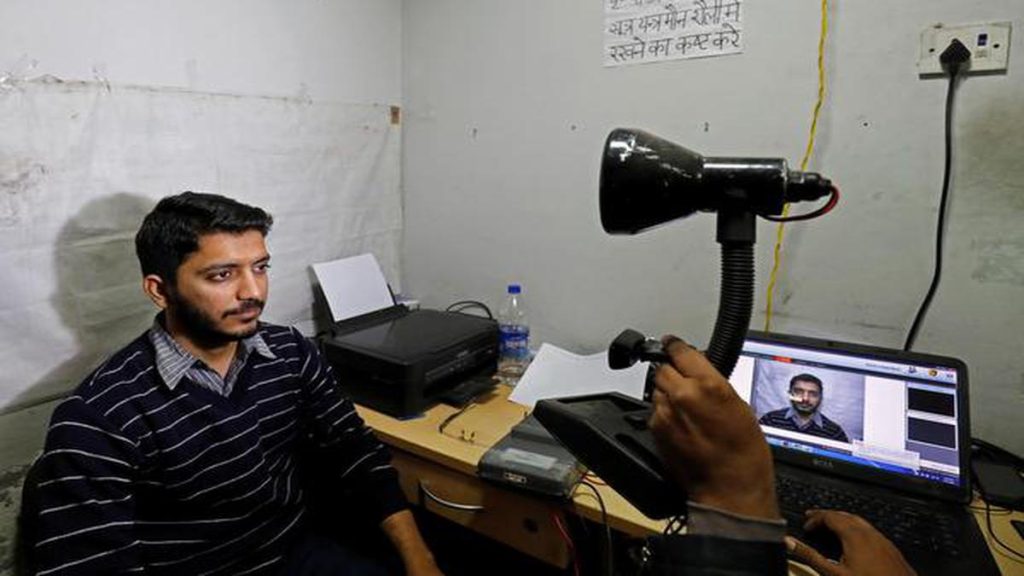Now Reading: Engineered B Cells: A Breakthrough in Treating and Understanding Diseases
-
01
Engineered B Cells: A Breakthrough in Treating and Understanding Diseases
Engineered B Cells: A Breakthrough in Treating and Understanding Diseases

Quick Summary
- No meaningful data about India can be extracted from this raw text. It is indeed primarily a list of academic references related to immunotherapy, gene therapy, and biotechnology advancements.
- The content provides citations exploring B-cell editing, AAV-mediated gene therapies, enzyme replacement therapy for rare diseases, and other biotechnological interventions.
Indian Opinion Analysis
This article contains bibliographic facts from various scientific studies on topics such as B-cell-based therapies and innovations in rare disease treatments but does not directly connect to india’s context or policies.While the global expansion of such medical technologies could potentially influence India’s healthcare landscape in the long term-especially considering its burgeoning biotech sector-the absence of india-specific content limits any concrete analysis about immediate implications or impact.
For further details: [source link not provided]Quick Summary:
- The raw text provided consists of reference citations from research studies, primarily focused on B cell engineering, gene therapy innovations, and immunology developments.
- Topics included range from CRISPR/Cas9 applications for antibody expression in plasma cells to vaccine elicitation of broad neutralizing antibodies against HIV using engineered B cells.
- Various studies highlight advancements such as homology-directed repair in human B cells, therapeutic protein secretion by engineered plasma cells, and single-cell analyses of bone marrow. Technologies are applied predominantly in non-human models or preclinical stages for conditions like hemophilia and leukemia.
indian Opinion Analysis:
The outlined research showcases cutting-edge developments in genetic engineering with direct implications for medicine globally. For India, where healthcare challenges include high burdens of diseases like hepatitis or HIV/AIDS alongside limited access to advanced therapies, this progress might inspire localized R&D efforts in collaboration with global institutions. Expanding gene-editing technology into ownership by Indian labs could bolster its standing as a biotech hub while addressing indigenous health issues efficiently.
Moreover, India’s commitment to fostering STEM talent positions it optimally to participate deeper within emerging fields highlighted-such as antibody therapies optimized thru biosynthetic + genome-partnership angles further solution-testing read across local case-flows/outbreak-path dependent… read more link missing.Quick Summary:
- The raw content appears to consist of research references related to advancements in immunology and biomedical sciences, including topics on B cell receptor editing, adoptive B lymphocyte therapies, immune tolerance regulation, and autoimmune disease studies.
- It cites numerous scientific research articles exploring applications such as cancer immunotherapy, glioblastoma treatment inhibition using antibodies, and regulatory functions of B cells in diseases like multiple sclerosis or lupus.
Indian Opinion Analysis:
India is emerging as a critical contributor in the global scientific community regarding healthcare innovation. With growing investments in genomics and biotechnology research within the country, developments listed in this report can serve as benchmarks for institutions like AIIMS or IISc that aim to advance immunotherapy or regenerative medicine for widespread diseases prevalent locally-including various cancers or autoimmune disorders. Such international studies also underscore India’s possibility to amplify collaborations with global laboratories for cutting-edge treatments benefiting Indian patients suffering from similar health conditions. Neutral observation portrays these citations pushing forward clinical science worldwide yet intensifies importance implementing regional adoption policy align R&D expansion robustness frameworks consistently Read more here.Quick Summary:
- The raw text primarily discusses advancements in immunology and gene therapy, notably focusing on B lymphocytes and their genetic modification for therapeutic purposes.
- Several references highlight the use of engineered B cells to induce immune tolerance or combat diseases such as autoimmune disorders, diabetes, HIV, and cancer.
- Techniques include gene-transferred peptide-IgG fusion proteins, lentiviral vectors for cell transduction, and reprogrammed quiescent B cells for cellular therapy applications.
- Studies span from innovations in specific antibody responses blunting with “decoy” cells to creating anti-HIV neutralizing antibodies using hematopoietic stem/progenitor cells.
indian Opinion Analysis:
India’s robust efforts toward advancing biotechnology place it among emerging leaders in health innovation.While the discussed technologies aren’t specific to India, they hold relevance due to rising demand for cost-effective genetic therapies across developing nations.The research touches upon engineered immune cells, a promising area that could address challenges like high rates of autoimmune diseases or inadequate access to specialized treatments. By actively investing in similar research directions or collaborating internationally on gene therapy innovations like lentiviral cell engineering systems or autoimmune disease treatment platforms illustrated here, India can leverage these advancements for both domestic application and global health solutions.
Link: Read moreQuick Summary:
- The article covers advancements and high-efficiency applications of genetic engineering in human cells, particularly B cells.
- it discusses methods like CRISPR/Cas9, homology-directed repair, and lentiviral vector systems in modifying human immune responses.
- Research details include engineered mechanisms for antibody production against diseases such as HIV, along with studies on antigen interaction mapping and stem cell migration techniques.
Indian Opinion Analysis:
The breakthroughs in gene engineering demonstrated here have potential global implications but hold particular relevance for India due to its high population density and burden of infectious diseases. Enhancing immunity through targeted cell modifications could address public health challenges associated with illnesses like tuberculosis or dengue that are prevalent in the country. Though, long-term viability remains a question as these methods need accessibility beyond advanced laboratories into practical healthcare setups affordable by diverse income groups within India.
Read more: Source ArticleQuick Summary
- The article discusses research involving plasma B cells in rhesus macaques. It covers methodologies like generation, expansion, gene delivery, and single-cell profiling.
- Bone marrow plasma cells require the receptor P2RX4 to sense extracellular ATP-a key finding highlighted from a related study.
- An interleukin-6 (IL-6) structure-function analysis was conducted using human/murine chimeric molecules, revealing two distinct domains involved in receptor binding.
Indian Opinion Analysis
This research underscores significant advancements in understanding immune cell functions and signaling mechanisms. For India, these scientific insights can inspire domestic researchers to leverage similar techniques for studying human diseases or developing targeted therapies. Collaboration with leading global institutions on projects of this nature could benefit India’s biotechnology and healthcare sectors by driving innovation and improving precision medicine applications within the country’s context.






















